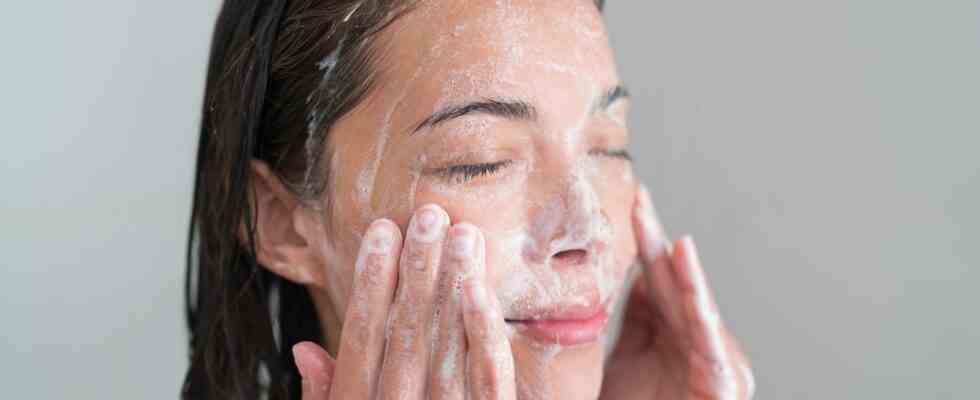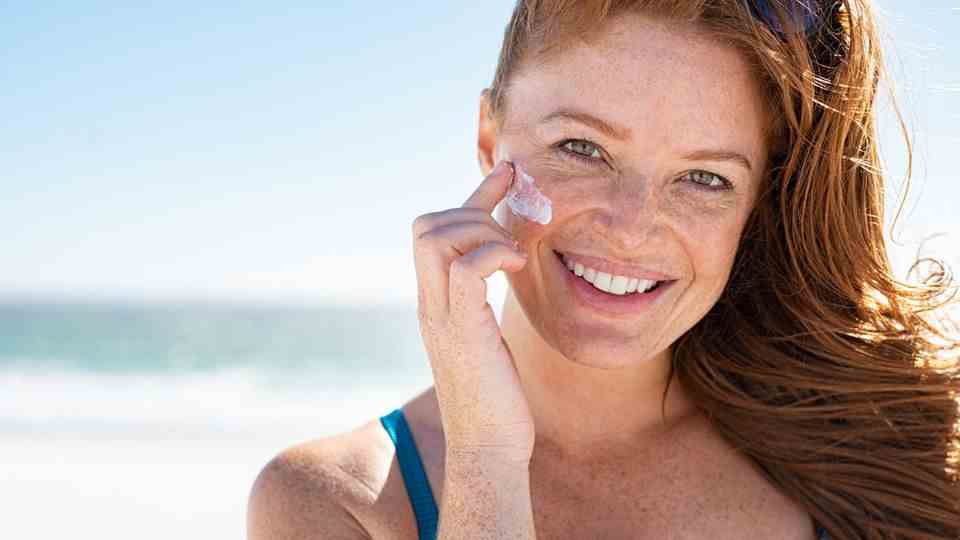Eco test
Washing gels against pimples in the test – cheap cleaner from the drugstore convinces
If you suffer from impure skin, you should cleanse your face every day. Ökotest gives top marks to six cleansing gels against pimples.
© Maridav/Getty Images
Oh, no – another pimple! Ökotest has tested 20 washing gels that are supposed to help with impure skin. The study shows that a high price does not automatically indicate a good product.
Unfortunately, pimples have a habit of popping up in the middle of your nose or chin whenever you have a date coming up or an important job interview. Frustration with impure skin is often great, not only among teenagers. Daily cleansing is important to rid the skin of excess sebum. But not every anti-pimple washing gel keeps what it promises. Ökotest tested 20 washing gels, creams and foams that are supposed to keep blemished skin in check. The five examined natural cosmetics products were rated “very good” across the board.
The testers took a close look at the ingredients and penalized products that contained questionable substances or failed to deliver on their promises. If a washing gel is advertised with slogans such as “antibacterial” or “bacteria-inhibiting”, Ökotest requested studies to prove this effect. If this did not happen, there was a point deduction for the cleaning gel in the test.
Expensive is not automatically good
One thing this study clearly shows: an expensive product does not automatically mean good ingredients. The most expensive washing gel “Australian Bodycare Face Wash Tea Tree Oil” fails with a “poor”. And that at a proud 9.95 euros for 100 milliliters. In addition to natural cosmetic products, only a conventional washing gel can achieve the top rating of “very good”. The “Isana Anti-Pimple Cleansing Gel for Clean Skin” not only impresses with its content, at 1.33 euros for 100 milliliters it is one of the cheapest products in the test. When it comes to natural cosmetic products, consumers sometimes have to dig a little deeper into their pockets: The cheapest washing gel “Bloomtime Clear Washing Cream Organic Grapefruit” is 2.29 euros per 100 milliliters. The “Weleda Clarifying Wash Gel” is the most expensive of the test winners at 8.95 euros.
Those who suffer from pimples and blackheads often have oily skin. So a lot of sebum is produced. A good cleansing gel should remove sebum, dirt and cosmetics from the skin. This is important: If excessive sebum cannot drain off because dead skin cells or cosmetics block the pore exit, the sebum accumulates to form pimples or blackheads. This is also a good breeding ground for certain bacteria, which in the worst case can cause inflammation.
Prevent premature skin aging: The seven best tips for healthy skin
7 images
Questionable substances in washing gels mean point deductions
Washing gels with surfactants free the pores of sebum, but not every washing-active substance has the same effect. The testers criticize the use of sodium lauryl sulfate because it is an aggressive surfactant and it is unsuitable for irritated or even inflamed skin. Another reason for bad grades were PEG/PEG derivatives in two-thirds of the conventional cleaners. These derivatives can make the skin more permeable to foreign substances.
Points were also deducted for halogenated organic substances. This is a group of substances that includes around 1000 substances, including, for example, bromine, iodine or chlorine. Many of them are considered allergenic. The consumer center also classifies halogenated organic compounds as “problematic ingredients” in cosmetics. Some of them are toxic to the environment and some are harmful to health. On the list of ingredients, they are often recognizable by the name components “fluoro”, “iodo”, “bromo” and “chloro”.
However, it is not advisable in every case of impure skin to try to get the impurities under control yourself. If inflamed pimples or red nodules no longer heal in those affected, a dermatologist should be consulted. The sebum provides a good breeding ground for acne bacteria. Early treatment can prevent scarring.
The complete (paid) test can be found here here!
Sources: Ökotest investigation, Consumer Center, Eco test



